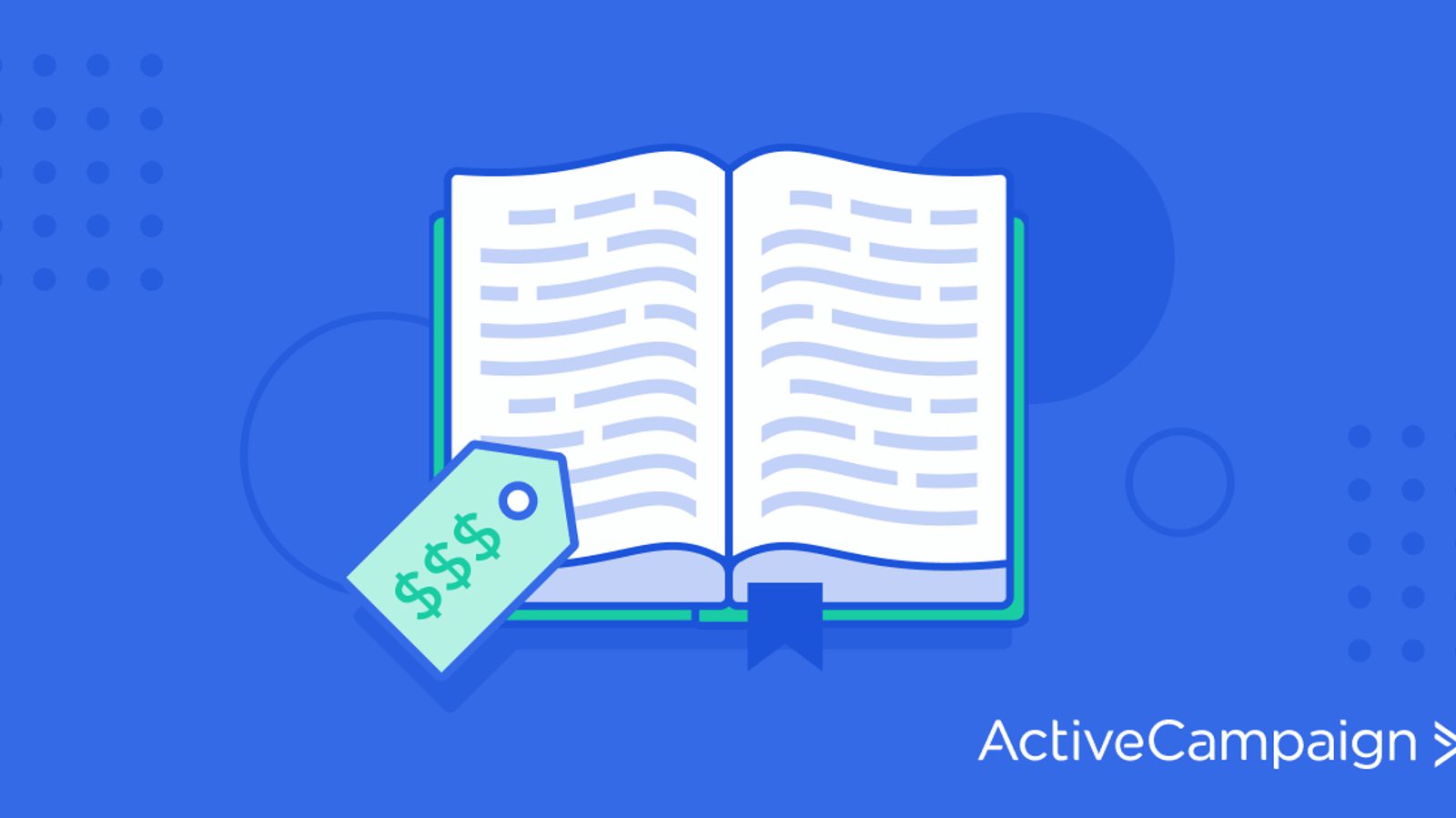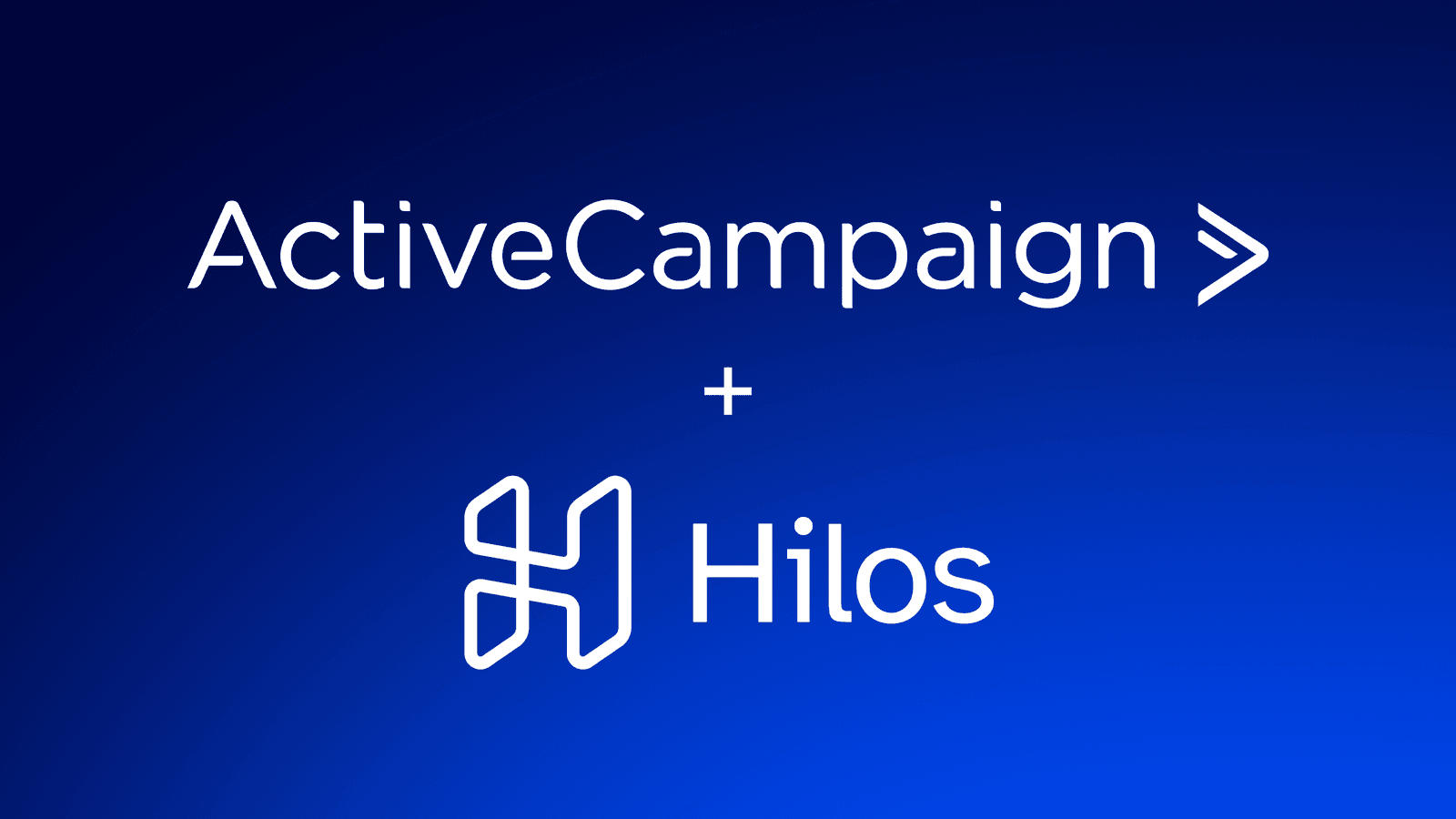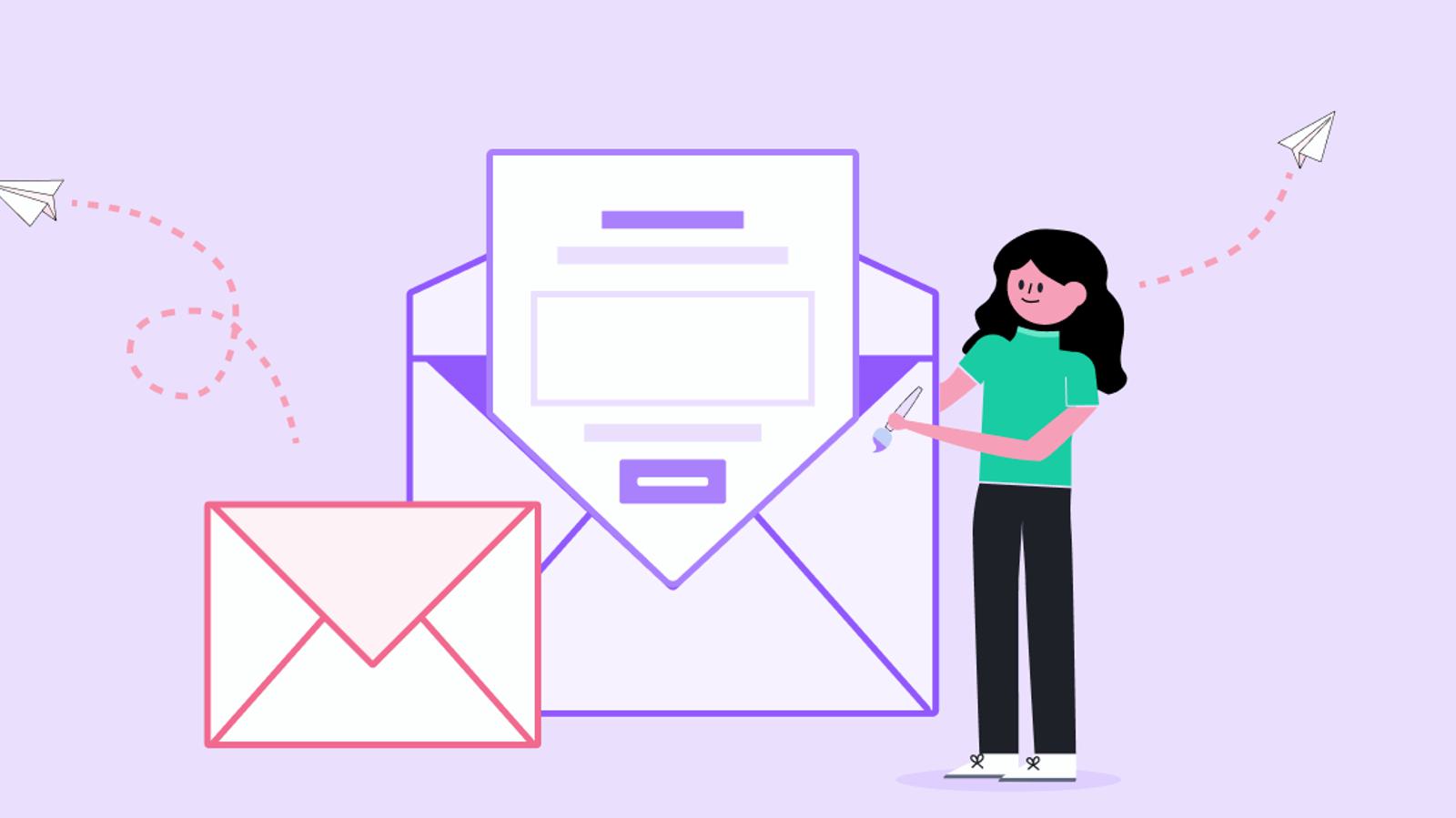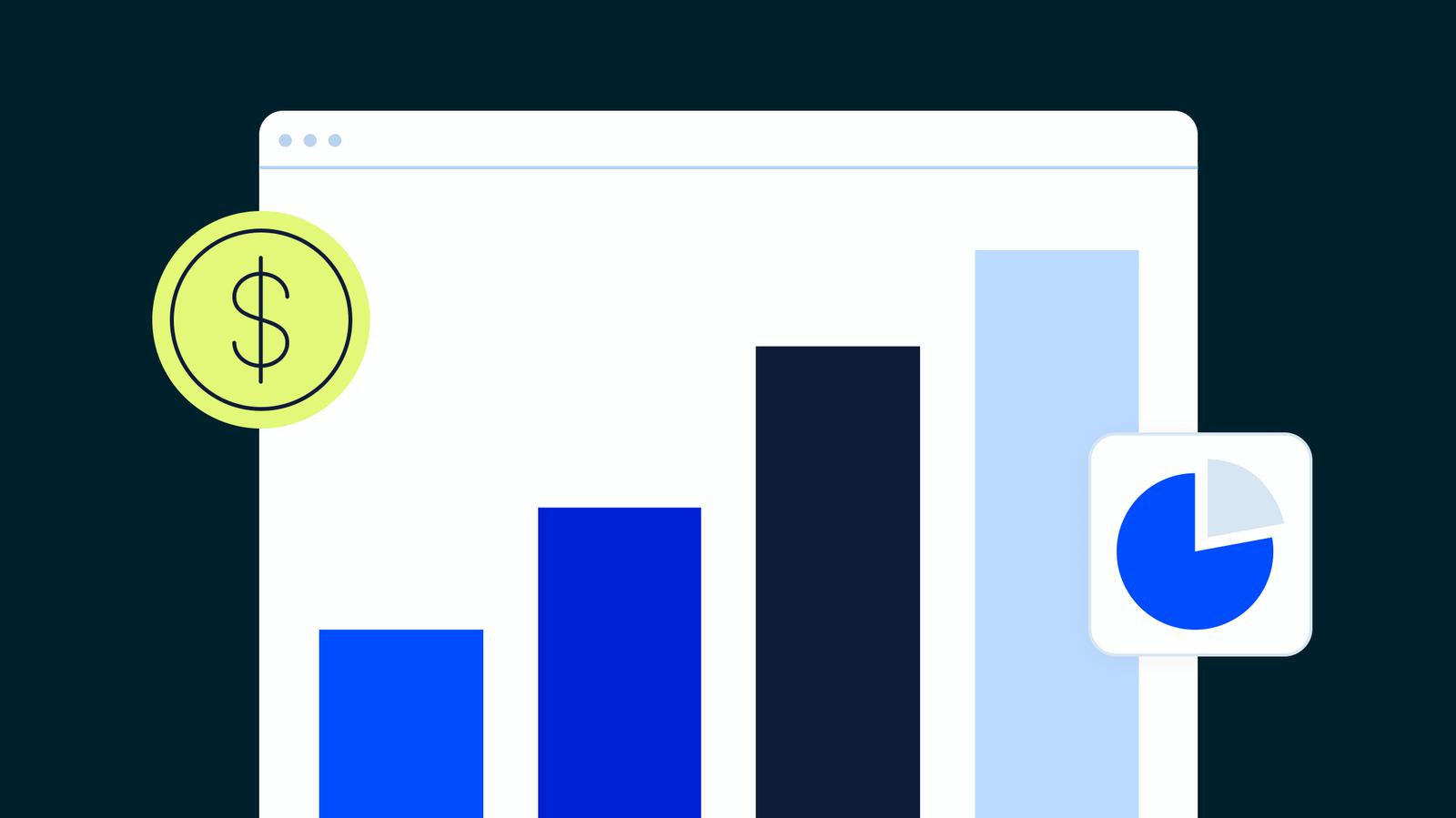If asked to describe the ideal product to sell, you might say something like “large profit margin,” or “easy to produce” or “high market demand.”
Or you might say “socks.” I don’t know you.
But the first three are all attractive ways to describe a business model – because they can get you quite a bit of revenue at little cost.
If you like the sound of that, information products may be for you. These are products that provide customers with some sort of information, often educational. Think ebooks or online courses.
With the right information product idea, you can stand to make a lot of money—and in some cases it can be the whole your business.
Your favorite marketer’s favorite marketing tool.
What exactly is an information product?
Information products are products where the most important part of what you sell is knowledge. Usually these products are sold digitally, and can be downloaded from your website.
Because "information" is the key value of an information product, they often don't have any kind of physical form.
Types of information products include:
- Ebooks
- Membership sites
- Webinars
- Cheat sheets
- Online courses
- Reports and analysis
- Templates and teardowns
- Live events
- Live event recording and recaps
In some cases information products aren’t digital. Coaching or mentorship as a product is one example of non-digital information products (as are in-person events).
In the days before the internet, it was common to see people selling “reports” or video courses on DVDs.
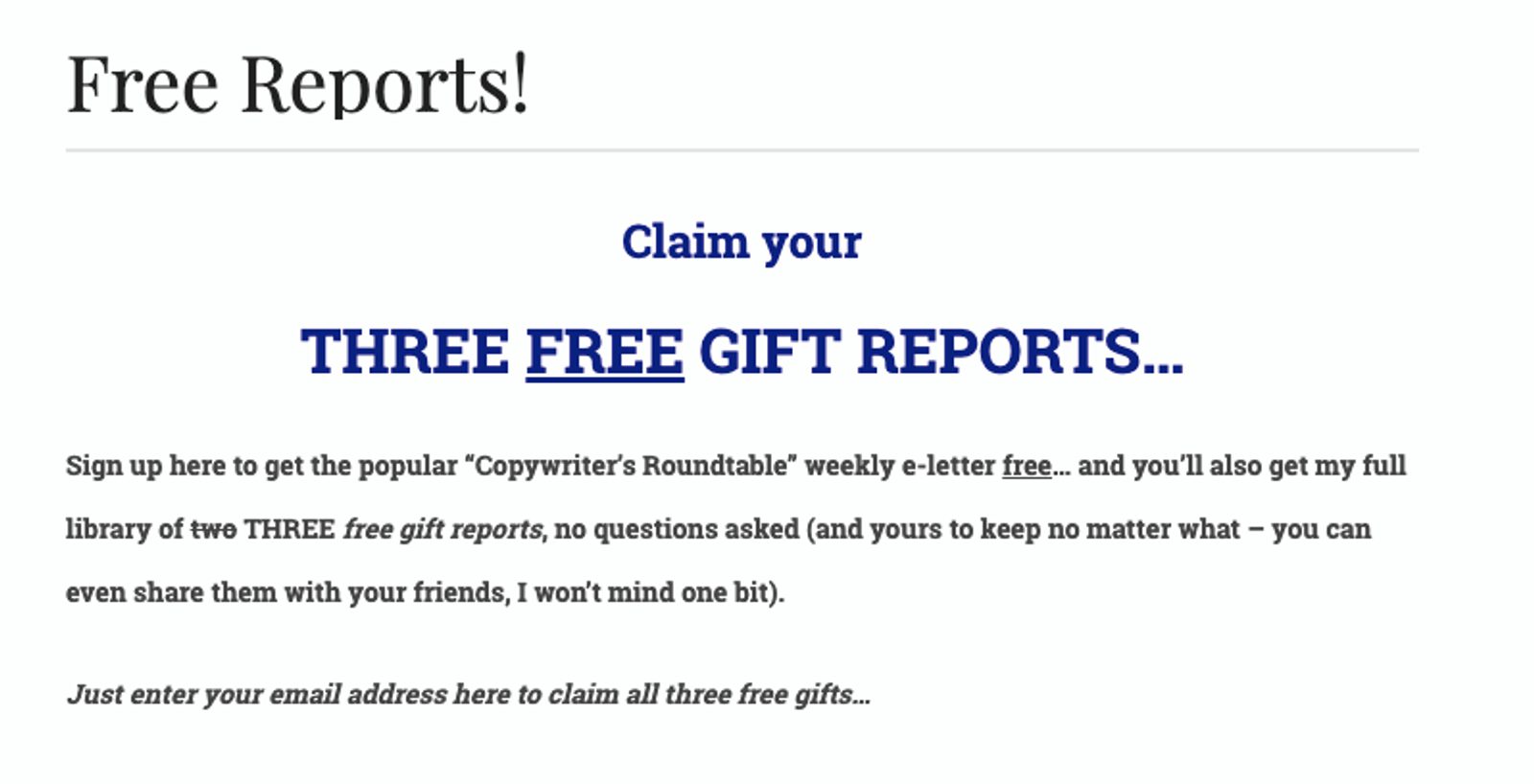
Legendary copywriters like Gary Halbert and Eugene Schwartz used to sell these reports using direct mail sales letters (Source)
Again, the key here is that the information in your product is what is valuable.
Books are valuable because of what’s on the pages—the pieces of paper themselves are mostly useless to you.
Who needs an information product idea?
Information products are a great opportunity for freelancers to stop trading time for money and start a more scalable business.
If you’re a freelancer, that means you have a lot of knowledge in a really specific field. You have a valuable skill set that people already pay you for.
Turn this knowledge into a product.
For example, imagine you’re a freelance UX designer. No doubt you know a thing or two about UX design – you could write up an ebook on “How to become a UX designer” and sell it on your website.
Information products have a key advantage – once you've created the first one, it doesn't cost you anything to create a 100 copies of it.
Fancy dipping into the world of freelancing? Arm yourself with our freelancer resources!
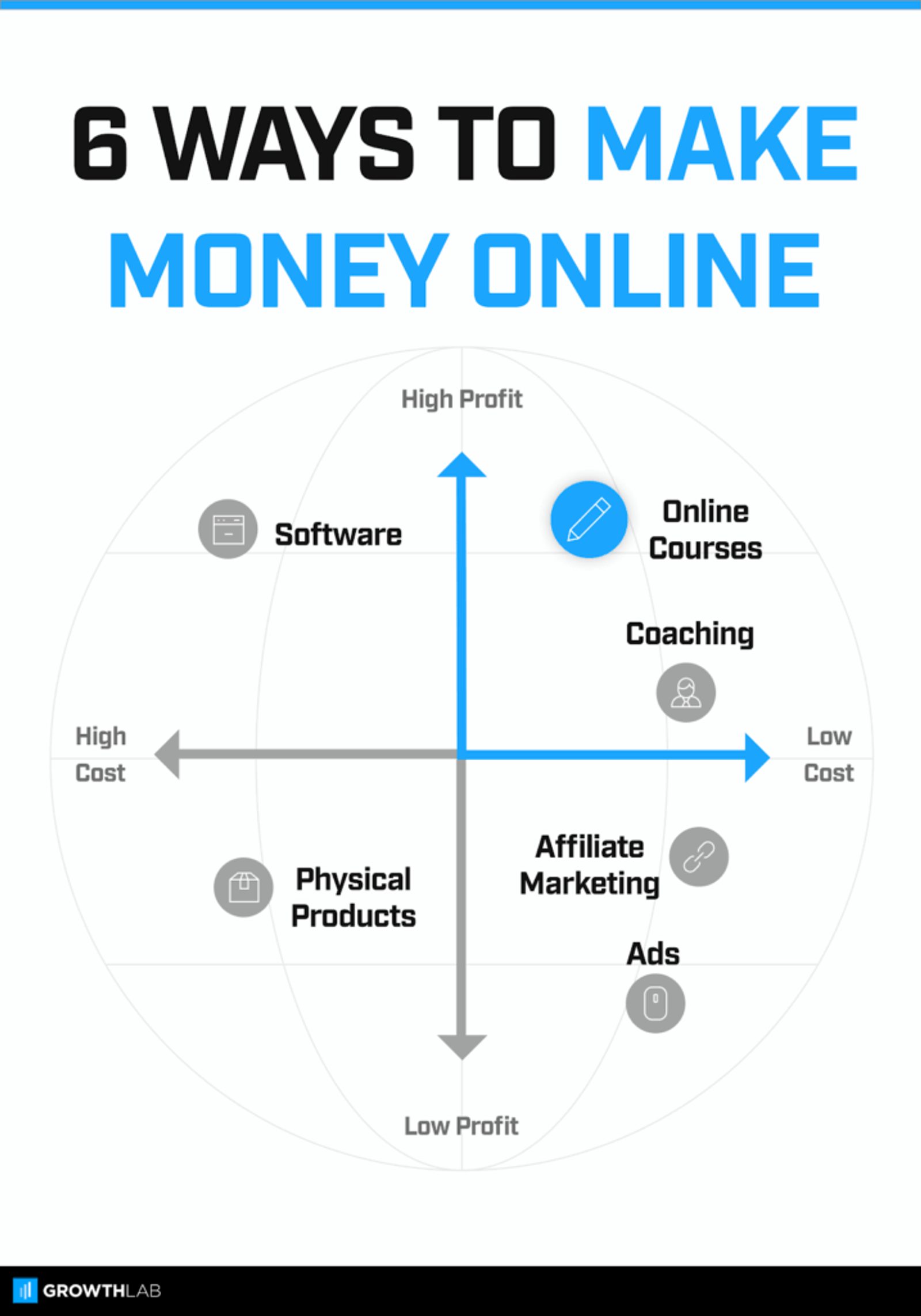
Online courses, a type of information product, have higher profits and lower costs than most product types (Source, GrowthLab)
Of course, you’ll likely have to do more than just put it on your website to attract sales, but fear not—there are plenty of effective strategies for launching an ebook.
And information products are for more than just freelancers.
If you run a small, service-oriented business, some sort of information product could be a nice little boost to your revenue.
Information products can also support other parts of your business by:
- Attracting future clients
- Supplementing current clients
- Selling to people who wouldn’t be able to afford your services
Information products can also serve as a nice little supplementary income for teachers and educators. There's lots of software that can make it easy for you to create and sell your expertise – without trading your time.
How to create information products
It’s easier said than done, right? Having a successful information product means doing more than putting some ideas in your head onto the internet.
Creating a successful information product can be a little daunting, even if you already run your own business. There’s a lot of logistical stuff to worry about (not to mention getting people to pay you for it!).
Of course, the problems you run into are going to depend on what type of information product you're making.
Usually, you can charge more for information products that are harder to make. Here's a quick example, using three of the most common types of information products:
- Ebooks: Ebooks are relatively easy to put together (if you already have the content, you could do it in an afternoon). But you probably won't be able to charge much more than $20.
- Online Courses: Online courses can be short or long, but usually involve some kind of video. Depending on how long they are, they can cost from $50 to thousands of dollars
- Membership Subscriptions: Memberships can be tricky to set up – and some work to get people to stick around. But you can usually charge people a monthly fee, sometimes in the hundreds of dollars
How do you make an information product?
A full guide is outside the scope of this post – but here's a quick summary of how you might go about creating an ebook or online course.
How to make an ebook information product:
- Write or assemble the content for your ebook (1 day – 6 weeks)
- Put your content into a PDF (10 minutes – 2 hours)
- Design a cover in Canva, or hire a designer on Fiverr (30 minutes – 1 week)
- Set up online payments via Stripe, or a membership platform like Podia or Wishlist (3 hours)
- Optional alternative: Accept your first payments via PayPal, to make things easier (20 minutes)
- Sell your ebook to your email list – use your email marketing software to send it to people after they buy (1 hour, then automated)
How to make an online course information product:
- Outline the number of videos in your online course (1 day)
- Write video scripts or outlines for each video (1 week)
- Record videos – PowerPoint or Google Slides with voiceovers are fine, and you can use Camtasia (3 days)
- Add the videos to your website through a plugin like Wishlist, AccessAlly, or Memberium. (2 days)
- Optional, possibly easier: Use a separate platform to host your course – like Teachable, Thinkific, or Podia
- Sell your online course via your email list – most membership platforms include payment processing (1 day)
What if you want to do some other kind of information product?
Want to see how we sell our product?
9 information product ideas
Okay, so you have a good grasp on what an information product is and why it can be so valuable. Now, we’ll go through a few ideas, so you can determine which product is the perfect for what you have to offer.
Here are 9 information product ideas you can set up in an afternoon:
- Ebooks
- Online courses
- Webinar recordings
- Live event recordings
- Live event recaps
- Membership sites
- Audio from expert interviews
- Q&As
- Workbooks and templates
1. Ebooks
Ebook info product cheat sheet:
- How long does it take to create an ebook? 2–6 weeks
- How much can you sell an ebook for? $15–30
- What skills do you need to create an ebook? Some writing and design skills are helpful (you can often outsource design)
An ebook is an electronic version of a regular book that can be read on a Kindle, laptop, tablet, whatever.

SJ Scott uses ebooks to monetize his blog posts and online business (Source, DevelopGoodHabits)
Of course, that doesn’t mean you need a print book to justify having one. Ebooks’ value are the ideas inside of them, so they sell best once you’ve established yourself as an authority on whatever topic is covered.
If you’re a real estate agent and you try to write an ebook about woodworking, you might run into problems. The key here is to first establish your expertise and then provide actual value in your ebook.
This not only ensures happy customers, but also repeat ones.
2. Online courses
Online course info product cheat sheet:
- How long does it take to create an online course? 2 weeks – 1 year
- How much can you sell an online course for? $50 – $5,000
- What skills do you need to create an online course? Some writing and video editing skills. Software like Camtasia or Movavi makes this more accessible.
We’ve seen the slow democratization of education over the past decade or so, and that will only continue—in part because of online courses.
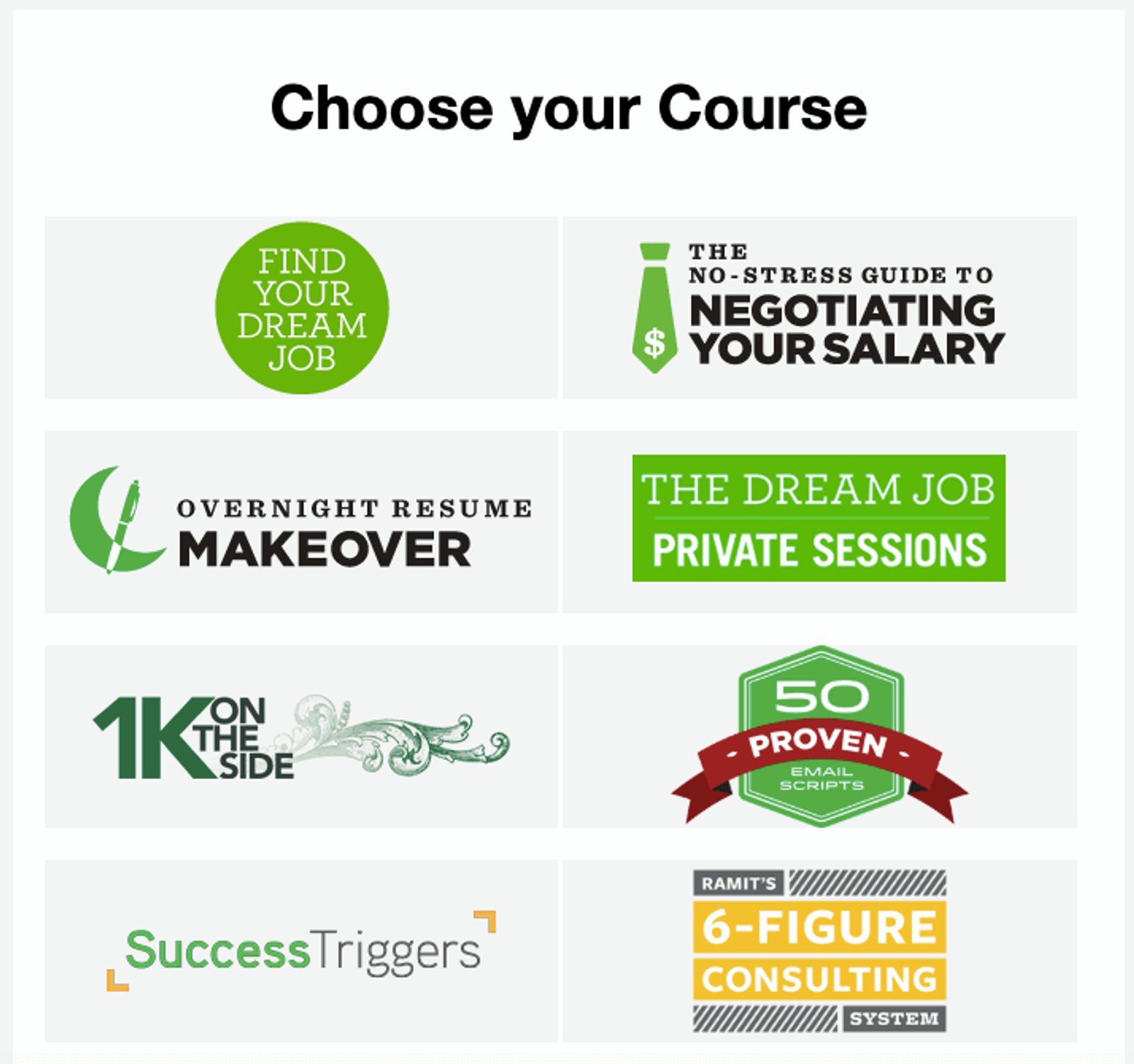
Ramit Sethi has built an 8-figure business by using online courses and email marketing (Source, IWT)
These come in a variety of shapes in sizes, from the more established types like lynda.com to smaller, sometimes more informal types like Jessica Sprague’s course on digital scrapbooking.
Like with ebooks here, the key to attracting students is proving your expertise. It doesn’t matter what your topic is, if you clearly know what you’re talking about, people will digitally attend.
3. Webinar recordings
Webinar info product cheat sheet:
- How long does it take to create a webinar product? 1 – 2 weeks
- How much can you sell a webinar for? $50
- What skills do you need to create a webinar? You'll need some knowledge of a webinar hosting tool.
Part of a webinar's value is the opportunity for interactivity, but just because someone misses out on the opportunity to ask a question to the presenter doesn’t mean they don’t want to hear what was said.
Webinars provide attendees with tons of rich and practical information, and people value that, even if it means watching it after the fact.
Webinar info products can be either live, private webinars – or recordings of high-quality public webinars.
4. Live event recordings
Live event recording info product cheat sheet:
- How long does it take to create a live event recording? The live event is the larger time restrictions here
- How much can you sell a live event recording for? $50 – $200
- What skills do you need to create a live event recording? You'll need some video skills – or you'll have to hire someone to do video at your event.
In college, I had a roommate who loved the band Phish. Every time they had a concert, he would go into his room and watch a recording of their concert at his desk.
Obviously, I thought he was crazy, but it makes the point that people will go out of their way to see something they’re interested in.
If you host or have access to live events that people from all over are interested in, you can likely turn a recording of it into a product of its own.
Live event recordings are especially useful as an add-on to an existing product. A lot of info products are sold in two tiers:
- Basic: You sell the bones of the product (the ebook, the course, whatever)
- Premium: You sell the bones of the product – along with add-on recorded interviews, event recordings, and premium coaching
You're already hosting the event – might as well squeeze some extra value out of it!
5. Live event recaps (written)
Live event recap info product cheat sheet:
- How long does it take to create a live event recap? If you take good notes, a few hours
- How much can you sell a live event recap for? $50
- What skills do you need to create a live event recap? Writing and design skills, similar to an ebook.
Written recaps of a live event will only work as a paid information product if there was useful information provided during the event. People likely won’t pay for a written recap of a concert, but a live speaking event about entrepreneurship is different.
Remember, it’s all about information, and if you can provide valuable information, people will buy.
6. Membership sites
We sat down with Memberium co-founder Micah Mitchell – he's got some great advice on membership sites.
Membership site info product cheat sheet:
- How long does it take to create a membership site? 1 week – 1-month setup
- How much can you sell a live event recap for? $15 – $300 per month
- What skills do you need to create a live event recap? You'll need to create some valuable content and moderate the community.
Like many other examples of information products, the key here is identifying a demand. This might mean creating an online community.
In some cases, a membership site will overlap with one of the other types of products. For example, you can create a series of online courses that are available to site members.
7. Audio from expert interviews
Audio info product cheat sheet:
- How long does it take to create an interview product? 1 - 5 days
- How much can you sell an interview for? $20
- What skills do you need to create an interview? You'll need some practice as an interviewer, and some audio recording.
People love to hear from experts. That’s why their speaking fees are so exorbitantly high.
We’ve talked a lot about how a key to selling an information product is proving your expertise. Well, when you get someone who’s already an established expert, that part is already done for you.
8. Q&As
Q&A info product cheat sheet:
- How long does it take to create a Q&A product? 1 - 5 days
- How much can you sell a Q&A for? $20
- What skills do you need to create a Q&A? You'll need some practice as an interviewer, and some audio recording.
Q&As can be incredibly valuable because they provide some of the most actionable, real-world advice out there.
Often times the person answering the questions will be speaking from their own experience. That means less theory, and more practice.
9. Workbooks and templates
Workbook info product cheat sheet:
- How long does it take to create a workbook product? 1 - 5 days
- How much can you sell a workbook for? $20 – $50
- What skills do you need to create an interview? You'll need some kind of skill with design, email coding, spreadsheets – or whatever type of template you have.
People looking for workbooks or templates of something will happily pay for them when done well. You might see information products out here for things like resume templates or website templates.
If your template is for something that your customers tend to use to make money (resumes, websites, or something else entirely), they will happily pay if your templates are effective. Check out our product sheet template for inspiration!
How to sell information products
Successful information products are successful because they’re great products – but they’re also successful because they have a great sales system behind them.
How do you sell your information products?
- Social media, especially Instagram, is becoming a popular platform to sell information products. You’ll need to have a pretty large following.
- Word of mouth can work if you sell high-priced products to a relatively small number of people. A reputation in your industry can help.
- Affiliate marketing, where other people sell your product in exchange for a small percentage of the sales, can work – but usually, this is a lot more work to manage than you anticipate.
- Email marketing is the best way to sell an information product (and make money online). Your email list wants to hear from you.
Email marketing is the best way to sell information products. If you look at the most successful online business models, they all make their sales through an email list.
How can you use email marketing to grow your business?
A detailed guide is outside the scope of this blog post – but we’ve put together a bunch of other resources to help you sell more with email.
- This email acquisition post will show you how to collect email addresses
- Your welcome email series can sell to new subscribers
- Your email newsletter can keep people thinking about you
- Your email funnels can sell your info products
Email earns about $40 for every $1 you spend on it, according to research from McKinsey. Your email list is the best way to sell your information product.
Conclusion: “Sell” information products for free
Information products have a low cost to produce and can be sold at high prices. They don’t take a lot of materials to produce—and if you have the right information product idea, they might not take much time either.
Once you have an information product, you need to sell it. With this…?
We’ve generally been talking about these information products as something you sell. And that’s often (even usually) the goal of information products.
But just because we’re calling it a product, doesn’t mean you need to sell it. Information products can also be used as a lead magnet, which can support your business by growing your audience and extending your reach.

